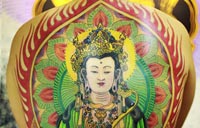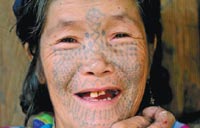|
Tattooist Dong Dong's artistic designs. Technological development enables Dong and his peers to diversify designs. Photos by Zou Hong / China Daily |
Body ink's social implications have continued evolving over millennia in China. Deng Zhangyu reports.
People feared Dong Dong's arms a decade ago. The middle-aged tattoo artist says he, in turn, feared people seeing his arms.
He felt like a "bad guy".
"The discrimination against people with tattoos still exists but is much less than it was decades ago," he says.
Dong says he has seen great changes in the more than 10 years he has run his Beijing studio.
But the Chinese history of tattoos as taboos spans millennia.
|
 |
| Chinese rethink ink |
 |
| Marks of ethnic identity |
The Song Dynasty (960-1279) tattooed convicts sent to do hard labor near the national borders, in case they fled into neighboring countries.
Revolutionaries aspiring to usurp Song Dynasty emperor Huizong re-invented tattoos' stigma into heroic symbolism. The revolt's leader Song Jiang - whose persona was made mythical in the fictional Outlaws of the Marsh, hailed as one of China's four classics - and his comrades coated their bodies in dragons and tigers. Tattoos became the trademark of the local culture in their hideout, the Liang Mountains.
Outlaws of the Marsh tells of 108 heroes - many of whom were tattooed brigands - whose uprising dealt a heavy blow to the ruler.
Consequently, tattoos shifted from the underworld to the upper crust in the Song dynasty, when the elite started to flesh out their ethos in ink.
|
|
|
|
|
|
|
|
